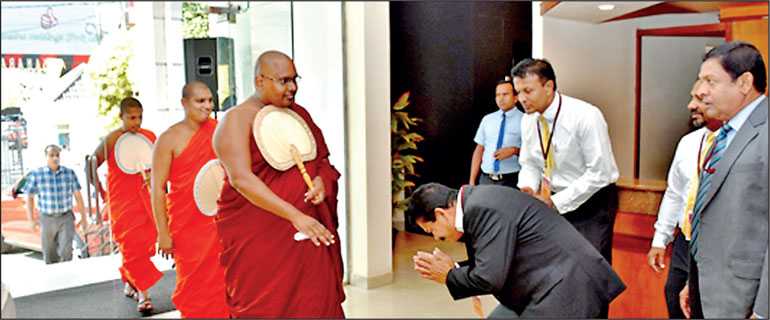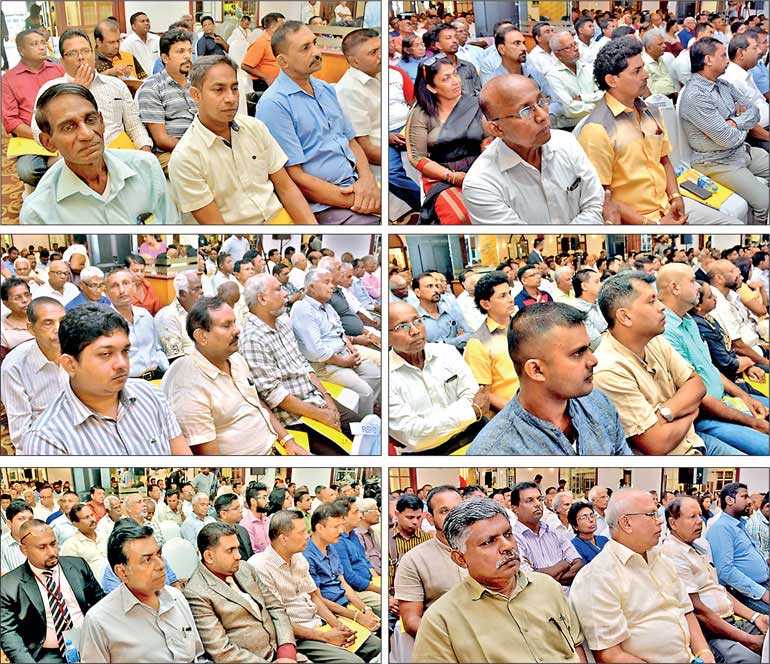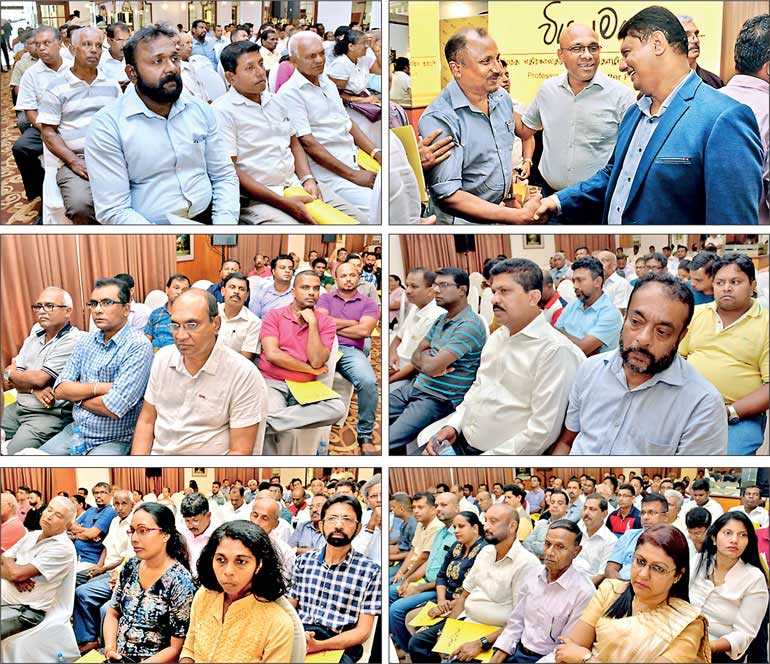Wednesday Feb 25, 2026
Wednesday Feb 25, 2026
Friday, 5 April 2019 00:00 - - {{hitsCtrl.values.hits}}
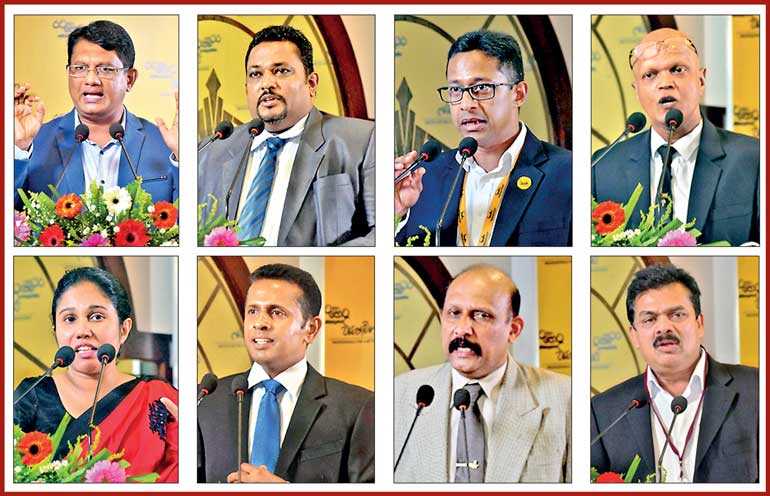
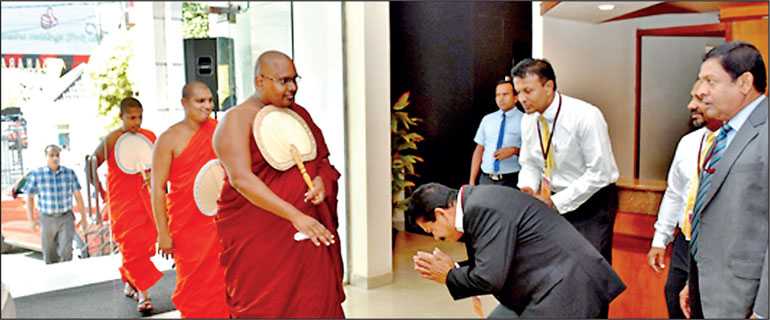
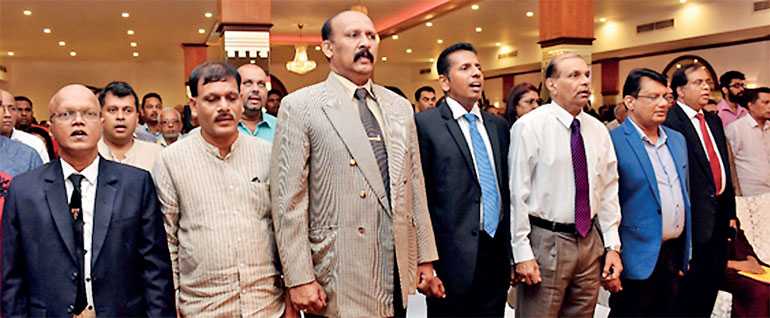
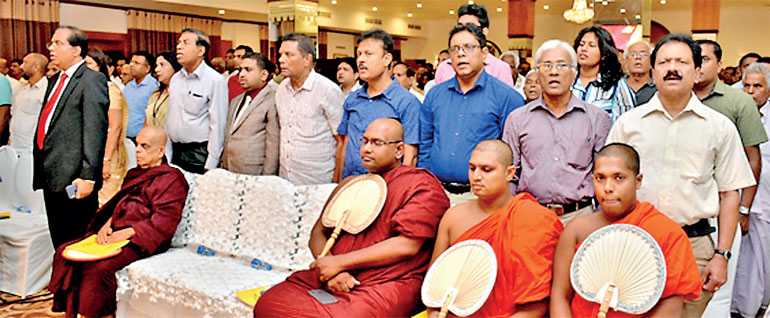
The ‘Country and Tomorrow’ series of seminars was conducted and organised by Viyath Maga was held recently at Biyagama. Dr. Nalaka Godahewa, Dr. Priyath Wickrama, Dr. Sita Aramabola, Lecturer Dr. Raja Gunaratne and Major General Kamal Gunaratne delivered the keynote speeches at the inaugural session of the seminar.
Below are excerpts of Dr. Godahewa’s keynote address on the theme of ‘Where is Sri Lanka’s economy heading to?’ at the inaugural lecture:
In 2005, former President Mahinda Rajapaksa assumed office at a time when the country was almost burnt down. On one hand, there was a terrorist war that was ongoing for over 20 years, and on the other hand, Sri Lanka’s economy was one of the weakest economies in Asia, recording a negative economic growth, just a year before the tsunami. All in all, our country was battered socially and economically.
Most of the people remember the Mahinda Rajapaksa phase as an era that defeated terrorism, but many people do not remember the economic reversal that was done during this period. From 2005 to 2014, there was a substantial positive change in the Sri Lankan economy.Sri Lanka’s economy expanded fourfold from $20 billion to $80 billion. Per capita income increased from $1,602 to $3,853, while foreign reserves rose from $0.23 billion to $8.3 billion. The unemployment rate fell from 8.3% to 4.3%, poverty levels reduced from 15% to 6%. The domestic electricity supply increased from 73% to 98%. Telephone usage increased from 36% to 120%. The number of students enrolling at universities increased from 14% to 18%. The growth of our economy was only second to China in Asia.The Colombo Stock Exchange (CSE), which was regulated under my purview was awarded as a sustainable stock market in Asia, and Colombo was awarded as the fastest growing city in Asia.
The Central Bank then predicted that by 2018 Sri Lanka’s economy will reach $6000 billion per capita, but with the change of administration, a group of rulers who had no vision took the economy on a downhill. Instead of the expected $127 billion economy, we have achieved an economy worth of $87 billion only.
Sri Lanka’s economy is growing at a very slow pace today. In the period 2015 to 2018, the economic growth rate has fallen from 6.8% to 3.1%. We are in a state of economic turmoil today. We are trying hard not to be among the weakest developing economies in Asia, competing against Afghanistan. Countries like India, Pakistan, Bhutan, and even Laos are far ahead of us.
The stock market is commonly seen as a barometer in the economy, because it reflects the confidence of investors and businesses in terms of economic management of a country.
During the period of 2014 to 2018 period, the total market share in the CSE has declined from $25 billion to $15 billion. A key reason for the collapse of foreign investors’ confidence in Sri Lanka was the massive bond scam, and the Government’s complacent policy towards handling the matter.
This scam was made twice in two years by the same group. The law enforcement agencies from time to time arrested and remanded certain people, but the Government has not yet prosecuted anyone. In addition, the main political culprit behind the robbery is still free.
The devaluation of the Rupee was a great example as to how the administration was mismanaging the economy. This caused the country a great economic loss, with doubling the amount of our imports. Due to the 30% rupee appreciation in the period of 2015 to 2018, this has now increased the domestic debt to Rs. 1,497 billion. Sri Lanka could have actually built more new ports like Hambantota from this humongous amount of money.
People pay taxes in any country in the world, but Governments don’t pressurise people. At that time, when President Mahinda Rajapaksa, also standing in as Finance Minister, said that taxes should be collected from people without penalising them. However, the current Government has burdened the public with its high interests and expenses over the last four years. During the period of 2015 to 2019, the Government has increased taxes by 100% from Rs. 1,050 billion to $2,077 billion.
When the present Government came into power, it promised the younger generation on dream cars, free Wi-Fi, and employment. Creating a million new jobs was a major political promise and now what is the reality?
According to Central Bank reports, the country has lost 454,000 jobs during the period of 2015 to 2018, mainly due to the collapse of small and medium enterprises (SMEs), and this also resulted in small scale projects being abandoned.
The current rulers cannot accomplish anything. All State-owned enterprises that they tried to operate are now running at a loss. The best example is the national carrier, SriLankan Airlines. One of the biggest propaganda campaigns against the previous Government was that SriLankan Airlines incurred losses. The highest cost of air travel is fuel prices. SriLankan Airlines suffered a loss of about $110 per barrel of crude oil per day. Despite, the present Government reduced its fuel prices by 50%, considering the low oil prices in the world market in 2015, the airline did not receive any advantage of that. If we imply the 2017 oil prices, we saw that SriLankan Airlines can run in a profitable manner, but under the low cost of fuel, the airline was still running at a loss. The loss in 2018 was $34 billion; this loss is more than the real cost of constructing Mattala airport — it’s a massive waste of our economy during the past four years.
These losses are far greater than the losses incurred by the previous Government’s hedging deal, the acquisition of the Greek Bond. The hedging loss was only Rs. 12 billion, while the Greek Bond loss is a bit less Rs. 800 million. However, the loss of the foolish decisions of the current Government is far greater. The loss due to the dispute that the Government had with architects of the Hyatt Hotel was Rs. 1.6 billion; way bigger than the loss incurred by the bond scam.
On the advice of the Prime Minister, SriLankan Airlines abrogated the state-of-the-art Airbus order, which had been ordered under a long-term plan by the previous Government. In the midst of this silly decision, the airline’s prospects for the future of the airline were greatly affected. The Government also ended up paying huge compensation of Rs. 17 billion to Airbus — it is bigger that the hedging deal.
You can recall that when the present Government came to power, they stopped the construction work of Colombo Port City project, and later it had a major negative impact on the Sri Lankan economy. One year later, the Government begged China to return, and had to pay a massive compensation of Rs. 26 billion. For this colossal amount of money, the Government could have provided fertiliser free for one year for all farmers in Sri Lanka.
The major economic losses during the period of 2015 to 2018 are due to bad decisions, frauds, and corruption, but the robberies carried out during this period is much larger. The loss of the Central Bank bond scam alone exceeds Rs. 1,000 billion.
As a whole, the past four years has been an era of great deterioration in the economy. The growth rate was not only lower from 7% to 3.1%, but the per capita income of 2017 and 2018 has not yet reached $6,000. By the end of 2018 it was only $3,980.
Instead of increasing foreign reserves, the debt burden has shrunk our reserves from $8.3 billion to $6 billion, while the debt to GDP has risen up to 91%. The All Share Index fell from 7299 to 6052. Debt burden has increased from 60% and tax burden has increased by 100%.
We can show 10 reasons for the current economic crisis:
The coalition Government without a proper principle
The damage of heavy bonds
The State is in deterioration
The collapse of local and foreign investors’ confidence
The funeral of the rupee
Government’s erroneous management decisions
Neglect of agriculture
Taxes which the people cannot afford
Unfaithful corruption, fraud, and waste
The daily debt trap
What do you need to do to save this economic trap?
There is a need for leadership
All stakeholders in the economy should be encouraged
Reduce unnecessary costs and reduce unnecessary spending
Taxes on public consumption should be reduced
The interest rate should be reduced
Make good money
The imperial capital must be revived
Seek honest solutions against the situation
The local businesses must be encouraged and encouraged
Foreign investors need to win the confidence again
Above all, this injurious Government should be chased away and it should be done in a democratic vote. The objective of Viyath Maga is to equip masses with the true state of our economy.
